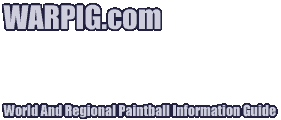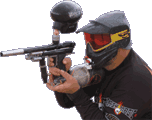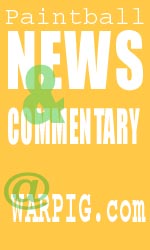  |
|
|
|
|
|
|
  |
|
|
|
|
|
|

Related Articles: 2001 NPPL Meeting 2001 NPPL Restructure 2002 NPPL/PSP Split 2002 NPPL/PSP Renegotiate Related Press Releases:
What do you think? Add your comments in WARPIG's Tourney TALK Forum
|
by Bill Mills 22 May, 2002 In a release dated May 21, 2002 the National Professional Paintball League announced that it would sanction the remaining three PSP produced tournaments of the 2002 season. According to the agreement, the tournaments will now bear the NPPL name, being the NPPL Chicago Open, the NPPL Atlantic City Open, and NPPL Paintball World Cup. 2002 has been a rocky season for the relationship between the NPPL and Paintball Sports Promotions. PSP itself was born in 2001 out of disagreements between the league and the promoters who produced NPPL sanctioned tournaments. The separate event producers banded together to form PSP in order to give themselves collective bargaining power as well as to use their resources collectively rather than competitively, to improve event quality. While the NPPL events produced by PSP in 2001 had substantial improvements over past events, not all of the goals laid out in their negotiations with the NPPL were met, and some events such as the Gettysburg tournament still fell far short in quality. In other areas, like the over $200,000 state of the art air system led to a definite improvement at events by reducing air fill lines that destroyed the Gettysburg schedule to nearly non-existent. Similar investments in netting and poles, as well as hiring Robert “Rosie” Rose to oversee the set-up of each site led to much better, and more consistent field set up in 2001 than had been seen at past NPPL tournaments. By the start of the 2002 LA Open, the NPPL and PSP had not hammered out an agreement for the 2002 season, but the event was sanctioned. As the second event approached an agreement had still not been settled. While the NPPL said it would be sanctioned, and PSP expected it would up to a few weeks away, an agreement did not come together in time. There were a number of points on which the league and promoters could not agree. According to Renick Miller of the PSP, the promoters paid the NPPL a $5,000 per event sanctioning fee through the 2001 season. In 2002, PSP questioned where that money was being spent. This action added fuel to the fire driving the split. In negotiations for the 2002 season PSP offered to cover a number of the league’s costs directly rather than pay them to the league. Specifically the promoters were unhappy with the low attendance of steering committee members at the negotiation meeting in November of 2001. According to Miller the promoters offered to pay a smaller sanctioning fee of $2,500 and directly cover the travel expenses of committee members attending the annual meeting, to ensure that they would be there. Miller felt that this, and other direct cost payments would total more than the previous $5,000 per event fee yet it would provide some guarantee that the league would follow through on commitments such as the annual meeting. The league on the other hand had problems with the contract they were offered by the promoters. According to NPPL president Chuck Hendsch the sanctioning contract would have tied the league to PSP exclusively for 5 years with a lower sanctioning fee, and the promoters approving who would sit on the league's steering committee and rules committee. The money, according to Hendsch was not so big an issue as the idea that the promoters would not be accountable to the players for their actions. When the league was originally formed it was owned by member teams that were shareholders in its corporation. The corporation was dissolved in 1999 by the State of New York for failure to pay taxes. This happened long after the league had ceased to function in accordance with its own articles of incorporation and bylaws. Following heavy criticism of the quality of the 2000 NPPL Paintball World Cup there was a resurgence of player leadership in 2000 and 2001 with the aim of working with new promoters who would do a better job, or getting the existing promoters to improve tournament quality. Chuck Hendsch formed NPPL, Inc. in the summer of 2001. At the present time, NPPL, Inc. is a California based corporation owned wholly by NPPL president Chuck Hendsch. While Hendsch plans to alter the structure of the corporation to make team owners become league shareholders similar to the league’s original structure, this has not yet happened, and is a process that will take time. A league meeting to be held in Chicago will address this issue, as well as NPPL leadership structure. Hendsch stresses that now is the time for players to make themselves heard, "Everyone talks about getting involved, here is the chance - come to Chicago, become a registered member of the league and get your team captain to attend the meeting - meeting registration can be done online at NPPL.com." In response to detractors who focus on Hendsch's ownership of NPPL, Inc. he stated, "I really want the key decision-making to be in the player's hands, that's what the league is about. We have a lot of growing pains right now as we reshape and reform the league." As negotiations were not completed in time for the second tournament of 2002, Paintball Sports Promotions did not include NPPL in the name of the event, or claim that the Las Vegas Open tournament was sanctioned. The NPPL, not being the sanctioning body of the tournament, ended up having to pay for booth space to promote themselves at the event. The Las Vegas Open turned out to be a lackluster event. Amongst the complaints coming from teams about the tournament were a schedule that placed the majority of some teams’ games in a single day, hot and dry weather, games running hours behind schedule, poor quality referees, and poor prize distribution. The week following the Las Vegas Open, the NPPL officially announced that it had split with Paintball Sports Promotions, and would produce the remainder of the 2002 NPPL series tournaments itself, beginning with an event that would compete directly with the PSP’s Chicago Open. In that announcement a number of claims were made which drew criticism from players and Paintball Sports Promotions. Prior to the announcement, a number of companies had already committed that if the league and promoters did split, they would sponsor the NPPL on it’s own. Following the announcement of the split, at least two key sponsors strongly suggested to both the NPPL and PSP that they resolve their differences, at least for the 2002 season. This resulted in the league and promoters going back to the negotiating table. For the league, new posibilities were open, as the promoters were now openly negotiating points with them, rather than using a take it or leave it approach. After about a week’s worth of negotiations, a contract was hammered out. The agreement, which was short enough to fit on a single sheet of paper, included stipulations binding both the promoters and the league. In order to maintain NPPL sanctioning, the promoters would need to meet a list of event criteria. According to Miller who handled much of the negotiations for PSP, this criteria was consistent with what the league had required, and the promoters had delivered at past events. Hendsch sees this "book of requirements" as a major step foreward, "We didn't get everything we wanted," he said "but it's a starting point that is in the best interest of the teams, and it is something we will be able to build on." According to the requirements, fields would need to be netted, concept fields would be used, etc. The league wanted grass playing surface to be on the list, but the final agreement lists grass as a preferred surface, not one that is required. Another change in the agreement that had been hold ups to previous negotiation, involved both the NPPL and the PSP being flexible enough to give in on a couple of points. PSP agreed to pay the full sanctioning fee of $5,000 per event. The league on the other hand agreed that it would ensure that all of the steering committee members who were physically able would be in attendance at the annual meeting to negotiate with the promoters. Central to the league's ideology, the agreement does not place league leadership in the hands of the promoters. “I think it worked out well. Players want to have a voice in how their tournaments are run. That’s why we founded the NPPL in the first place,” Miller said referring to the fact that the majority of PSP’s owners also owned teams that were founding members and shareholders in the original league. “If the split had been permanent we would have put together a new system of player representation. After all, the players are PSP’s customers and the only way we can succeed is to give them the product they want.” NPPL President Chuck Hendsch has taken a lot of heat during the split and negotiations, and wanted to make clear his intentions through the recent political upheval, "I've been a player in the industry for 18 years - that's why I'm doing this. I love the sport, and I know we can make it better! It's all about fairness, safety and quality." Looking forward to the rest of the 2002
season, Hendsch sees the PRO referees as playing an important role.
PRO refereed a single field in Los Angeles, and a single field in Las Vegas.
In Chicago, Hendsch expects that they will cover two fields, three or four
in Atlantic City, and hopefully as many as five at World Cup, with PRO
referees handling all of the semifinal and finals games.
|
| Copyright © 1992-2019
Corinthian Media Services. WARPIG's webmasters can be reached through our feedback form. All articles and images are copyrighted and may not be redistributed without the written permission of their original creators and Corinthian Media Services. The WARPIG paintball page is a collection of information and pointers to sources from around the internet and other locations. As such, Corinthian Media Services makes no claims to the trustworthiness or reliability of said information. The information contained in, and referenced by WARPIG, should not be used as a substitute for safety information from trained professionals in the paintball industry. |